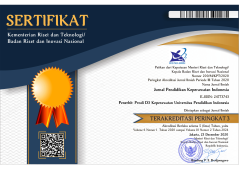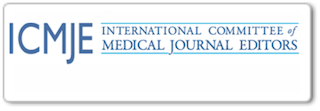Gambaran Persepsi Mahasiswa Terhadap Perilaku Pencegahan Diabetes Mellitus di Fakultas Keperawatan Universitas Padjadjaran
Abstract
ABSTRAK
Perilaku pencegahan Diabetes Mellitus ditentukan oleh keyakinan dan persepsi seseorang mengenai ancaman kesehatan yang dirasakan. Gaya hidup tidak sehat yang dilakukan oleh mahasiswa cenderung dapat meningkatkan resiko terjadinya Diabetes Mellitus, sehingga perlu dilakukan upaya pencegahan Diabetes Mellitus. Tujuan penelitian ini adalah untuk mengetahui persepsi mahasiswa terhadap perilaku Pencegahan Diabetes Mellitus. Penelitian deskriptif kuantitatif ini melibatkan 242 sampel yang ditentukan menggunakan stratified random sampling. Data dikumpulkan menggunakan instrumen Health Belief Model (HBM), yang terdiri dari 5 domain yaitu, persepsi kerentanan dan keseriusan, persepsi manfaat, persepsi hambatan, isyarat melakukan tindakan, dan self-efficacy. Data dianalisis dengan analisis deskriptif (frekuensi dan persentase). Hasil penelitian ini menunjukkan bahwa seluruh responden (100%) memiliki persepsi positif terhadap perilaku pencegahan Diabetes Mellitus. Adapun persepsi berdasarkan 5 domain didapatkan seluruh responden (100%) memiliki persepsi positif terhadap manfaat pencegahan Diabetes Mellitus, hampir seluruh responden memiliki persepsi positif terhadap kerentanan dan keseriusan (92,6%), isyarat melakukan pencegahan (98,3%), self-efficacy dalam melakukan pencegahan Diabetes Mellitus (92,6%), dan lebih dari setengah responden memiliki persepsi positif terhadap hambatan melakukan pencegahan Diabetes Mellitus (59,5%). Walaupun demikian, terdapat kurang dari setengah responden (40,5%) yang memiliki persepsi negatif terhadap hambatan, yang berarti bahwa responden tersebut merasakan adanya hambatan dalam melakukan pencegahan Diabetes Mellitus. Dapat disimpulkan bahwa seluruh responden mempersepsikan perlunya melakukan pencegahan Diabetes Mellitus. Namun, adanya hambatan dalam melakukan pencegahan Diabetes Mellitus, perlu diadakannya promosi kesehatan yang memotivasi mahasiswa untuk mengatasi hambatan yang dirasakan dalam melakukan penegahan Diabetes Mellitus.
ABSTRACT
Unhealthy lifestyle undertaken by students tended to increase the risk of Diabetes Mellitus, so there should be the effort to prevent Diabetes Mellitus. Prevention behaviors are determined by belief and perception about perceived of threats. This study aimed to identify student's perception towards prevention behavior of Diabetes Mellitus. This descriptive quantitative study involved 242 students were taken with stratified random sampling. Data collected by Health Belief Model (HBM) instrument that consisted of 5 domains; perceived susceptibility and severity, perceived benefits, perceived barriers, cues to action, and self-efficacy. Data analyzed with descriptive analysis (frequency and percentage). Result showed that all of respondent (100%) had positive perception towards prevention behavior of Diabetes Mellitus. The results of the perception based on 5 domains showed that all of respondent (100%) had positive perceived benefit, most of responden (92,6%) had positive perceived susceptibility and severity, cues to action (98,3%), self-efficacy (92,6%) and more than half of respondents (59,5%) had positive perceived barriers. However, less than half of respondent (40,5%) had negatively perceived barriers which indicated that respondent felt the barrier of Diabetes Mellitus prevention. To conclude, all of respondent perceived necessary to do Diabetes Mellitus prevention. Whereas, there was a barrier in Diabetes Mellitus prevention so, there should be health promotion to motivate students to overcome their perceived of the barrier to perform Diabetes Mellitus prevention
Keywords
Full Text:
PDFReferences
Al-Mutairi, R., Bawazir, A. A., Ahmed, A. E., & Jradi, H. (2015). Health Belief Related to Diabetes Mellitus Prevention among Adolescents in Saudi Arabia. Sultan Qaboos University Med Journal, hlm.398-404.
Arisman. (2010). Obesitas, Diabetes Mellitus, & Dislipidemia : Konsep, Teori, dan Penanganan Aplikatif. Jakarta: Penerbit Buku Kedokteran EGC.
Ayele, K., Abebe, L., Tilahun, T., Tesfa, B., & Girma, E. (2012). Self Care Behavior among Patients with Diabetes in Harari, Eastern Ethiopia: The Health Belief Model Perspective. PLaS ONE Volume 7, hlm.1-6.
Bieda, J. (2009). Perceptions of Risk For The Development of Type 2 Diabetes in African-American Women With Gestational Diabetes. (Disertasi). The University Of Michigan, USA.
Capener, E., & Gallimore, K. (2014). Knowledge and Perception of Consequences of Type 2 Diabetes : A Cross-Sectional Study. European Journal of Nutrition & Food Safety, hlm.261-262.
Dong-Chul, S., Torabi, M. R., Kaigang, L., Jhon, P. M., Woodcox, S. G., & Perera, B. (2008). Perceived Susceptibility To Diabetes And Attitudes Towards Preventing Diabetes Among College Students At A Large Midwestern University. American Journal of Health Studies, hlm.143-150.
Fischetti, N. (2015). Correlates among Perceived Risk for Type 2 Diabetes Mellitus, Physical Activity, and Dietary Intake in Adolescents. Continuing Nursing Education CNE, hlm.126-131.
Glanz, K., Rimer, B. K., & Lewis, F. M. (2008). Health Behavior and Health Education Ed. 3. USA: Jossey-Bass.
Hartzler, M. L., Chen, A. M., Murphy, B. L., & Rodewald, S. J. (2014). Evaluation of Jamaican Knowledge of Diabetes and Health Beliefs. Christian Journal for Global Health, hlm.19-28.
Internasional Diabetes Federation. (2015). Diabetes In Indonesia. Retrieved Januari 24, 2016. (Online). Diunduh dari https://www.idf.org/membership/wp/indonesia
Kim, H. S., Ahn, J., & No, J. K. (2012). Applying the Health Belief Model to college students' health behavior. Nutrition Research and Practice, hlm.551-558.
Nuraliyah, Syam, A., & Hendrayati. (2014). Aktivitas Fisik dan Durasi Tidur Pada Penderita Overweight Dan Obesitas Mahasiswa Universitas Hasanuddin. Repository Unhas, hlm.1-11.
Sirait, A. M., Sulistiowati, E., Sihombing, M., Kusuma, A., & Idayani, S. (2015). Insiden dan Faktor Resiko Diabetes Melitus Pada Orang Dewasa Di Kota Bogor Studi Kohor Prospektif Faktor Resiko Penyakit Tidak Menular. Buletin Penelitian Sistem Kesehatan Vol. 18, hlm.151-160.
Solihah, S. N., Sari, C. W., & Yamin, A. (2013). Faktor-faktor Yang Berhubungan Dengan Perilaku Perawatan Diri Pasien DM Tipe 2 Di Polikilinik Endokrin RSUP Hasan Sadikin Bandung. (Skripsi). Universitas Padjadjaran, Jatinangor.
Surjadi, C. (2013). Globalisasi dan Pola Makan Mahasiswa: Studi Kasus di Jakarta. CDK-205 Vol 40 no 6, hlm.416-421.
Tafti, A. D., Mahmoodabad, S. S., Morowatisharifabad, M. A., Ardakani, M. A., Rezaeipandari, H., & Lofti, M. H. (2015). Determinans od Self-Care in Diabetic Patients Based on Health Belief Model. Global Journal Health Science Vol. 7, hlm.33-42.
Vahidi, S., Shahmirzadi, S. E., Shojaeizadeh, D., Haghani, H., & Nikpour, S. (2015). The effect of an Educational Program Based on the Health Belief Model on Self-Efficacy among Patients with Type 2 Diabetes Referred to the Iranian Diabetes Association in 2014. Journal of Diabetes Mellitus, hlm.181-189.
Vazini, H., & Barati, M. (2015). The Health Belief Model and Self-Care Behaviors among Type 2 Diabetic Patients. Iranian Jornal Of Diabetes And Obesity Volume 6, hlm.107-113.
WHO. (2015). 10 Facts About Diabetes. (Online). Diunduh dari http://www.who.int/features/factsfile/diabetes/facts/en
WHO. (2015). 10 Facts on Obesity. (Online). Diunduh dari http://www.who.int/features/factfiles/obesity/facts/en
WHO. (2015). Diabetes. (Online). Diunduh dari http://www.who.int/mediacentre/factsheets/fs312
DOI: https://doi.org/10.17509/jpki.v4i1.12345
Refbacks
- There are currently no refbacks.
Jurnal Pendidikan Keperawatan Indonesia(JPKI) published by Indonesia University of Education. JPKI is licensed under a Creative Commons Attribution-ShareAlike 4.0 International License.
Office :
Nursing Department. FPOK UPI.
229, Dr. Setiabudhi Street. Bandung 40154
West Java , Indonesia
E-mail : jpki@upi.edu

_.png)
_.png)
_.png)











